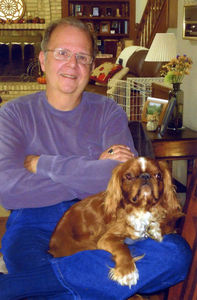Richard Teleky Examines the "Ordinary Paradise" of the Unnoticed Art That Constantly Surrounds Us
Sometimes it is easy to forget we are constantly surrounded by works of art. In postcards and prints, books and movies, home crafts, and songs on the radio, we experience what author Richard Teleky refers to as a kind of "ordinary paradise". The conscious decision to focus on what a wonder it is to be surrounded by artistic achievement at all times is a refreshing and positive position to take, and it's what inspired the essays in Teleky's Ordinary Paradise (Porcupine's Quill).
The idea that the extraordinary quickly becomes ordinary is a simple one but easy to overlook. The book is a thoughtful meditation on being present in the beauty around us, as well as interrogating troubling trends in the way art is currently appreciated and evaluated. And on the other side of the creative coin, Teleky also examines certain challenges and tensions in the lives of artists.
From what re-reading can tell us about ourselves to the connection between language and marginalized voices, this is a mature and intelligent rumination on the nature of truth and beauty through a concrete and relatable lens.
We're pleased to have Richard on Open Book today to share about the literary art he appreciates around him, namely his favourite and formative books.
He tells us about the book he kept under his pillow as a boy, the allure of forbidden books, and the Nobel Laureate who inspired him.
The WAR Series: Writers as Readers, with Richard Teleky
The first book I remember reading on my own:
Black Beauty by Anna Sewell. I was about seven, and slept with it under my pillow. I didn’t want a horse, I wanted the book nearby.
A book that made my cry:
A Death in the Family by James Agee.
The first adult book I read:
A Rage to Live by John O’Hara. I was maybe ten, and the book – which belonged to my parents – was off-limits, so I had to know why.
A book that made me laugh out loud:
The Life and Opinions of Maf the Dog, and of His Friend Marilyn Monroe by Andrew O’Hagan. (It’s also very sad.)
The book I have re-read many times:
Flaubert’s Madame Bovary (in the Francis Steegmuller translation) because I teach it every year, and for escapist pleasure, Brideshead Revisited by Evelyn Waugh.
Your CanLit News
Subscribe to Open Book’s newsletter to get local book events, literary content, writing tips, and more in your inbox
A book I feel like I should have read, but haven’t:
Finnegans Wake.
The book I would give my seventeen year old self, if I could:
At seventeen I read Sons and Lovers by D.H. Lawrence – perfect for that self. Now I’d add a good translation of Montaigne’s Essays.
A book that strongly influenced me as a writer and why:
Doris Lessing’s The Four-Gated City. She could go almost anywhere in her novels, which told me to follow my stories.
The best book I read in the past six months:
The novel Katalin Street by Magda Szabo.
The book I plan on reading next:
I always have several books going at the same time: David Washburn’s new translation of Murasaki Shikibu’s The Tales of Genji; Colin Thurbon’s novel Night of Fire; and Svetlana Boym’s study The Future of Nostalgia.
A possible title for my autobiography:
An unlikely prospect, so for now Untitled.
_______________________________
Richard Teleky is an author, editor and educator who has published a dozen books of poetry and prose (both fiction and non-fiction), including most recently The Blue Hour(Exile Editions, 2017) and The Hermit in Arcadia (Exile Editions, 2012). His novel The Paris Years of Rosie Kamin(Steerforth, 1998) won the Harold Ribalow Prize. He is a professor in the Humanities Department of York University and lives in Toronto.




